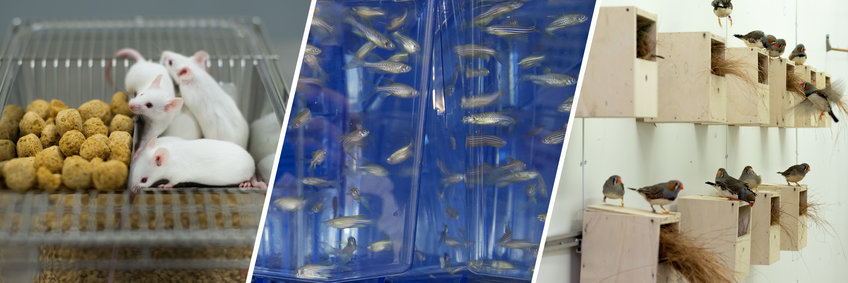
Animal care at the Max Planck Institutes Martinsried and Seewiesen
The main tasks of the animal facilities are the housing, care and breeding of different animal species and lines. The selection of the animals kept is made in close coordination with the research requirements of the scientists of the institutes.
Only healthy animals can meet the requirements of research. Not least for this reason, the animal houses ensure that the housing of and handling of laboratory animals meet the highest level of hygiene as well as the natural needs of each species. The quality of these high standards is ensured by employed veterinarians and trained personnel and monitored by animal welfare officers.
Animal care Martinsried
The animal facility is available to researchers of the Max Planck Institute for Biological Intelligence, the Max Planck Institute for Biochemistry and the Max Planck Institute for Psychiatry. In addition to the services provided by the animal house with advice and support for the scientists, they can also access a local immunization service.
The main species kept (> 90 percent) are mice, rats and zebrafish. The majority of laboratory animals for the scientific projects of the institutes are bred and raised by the animal house.
The breeding and keeping of fruit flies, which are also used for many research projects, takes place in special laboratories directly at the institutes and lies in the responsiblility of the respective departments and groups.
Colleagues from the institutes please follow this (internal) link to the intranet pages.
Animal care Seewiesen


At the location Seewiesen, the main focus is on keeping birds. In addition to a large number of zebra finches and canaries, several other songbird species are kept, e.g. siskins, starlings, butterfly finches, gouldamadins and other finches. However, non-singing birds, such as Canada geese, pigeons, ruffed rabbits, tinamous and ratites are also represented. We also have species of fish, amphibians and reptiles.
The husbandry of the different animal species varies depending on the project and the research conditions. In our animal houses this ranges from cages and commercial aviaries to large outdoor enclosures, such as a large floating aviary on the Eßsee in summer. There is also a wind tunnel in Seewiesen to study behavior during flight and a quarantine station. The entire husbandry meets current hygiene and animal welfare requirements and in most areas goes far beyond them.
The highly diverse needs of the animals and the vastness of the grounds pose a special challenge for care. A team of 16 animal keepers takes care of the animals' well-being.
If you have any questions about our animal care, please feel free to contact our communications office.

